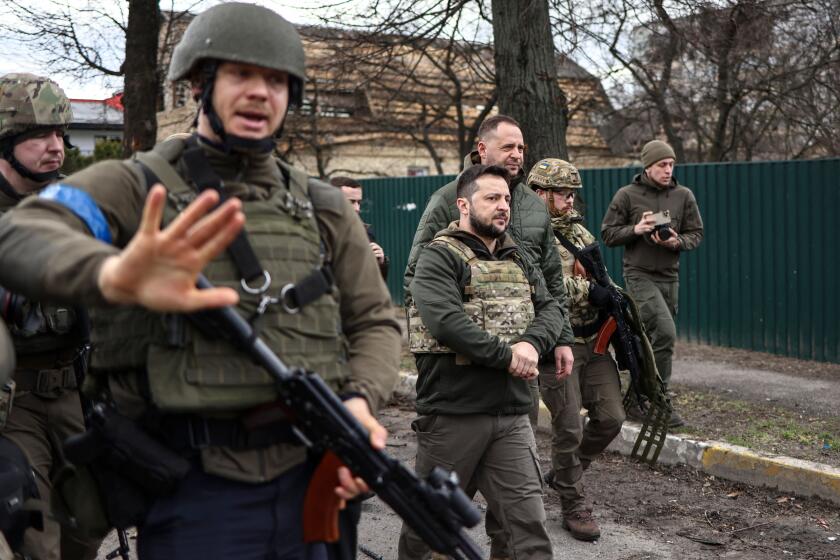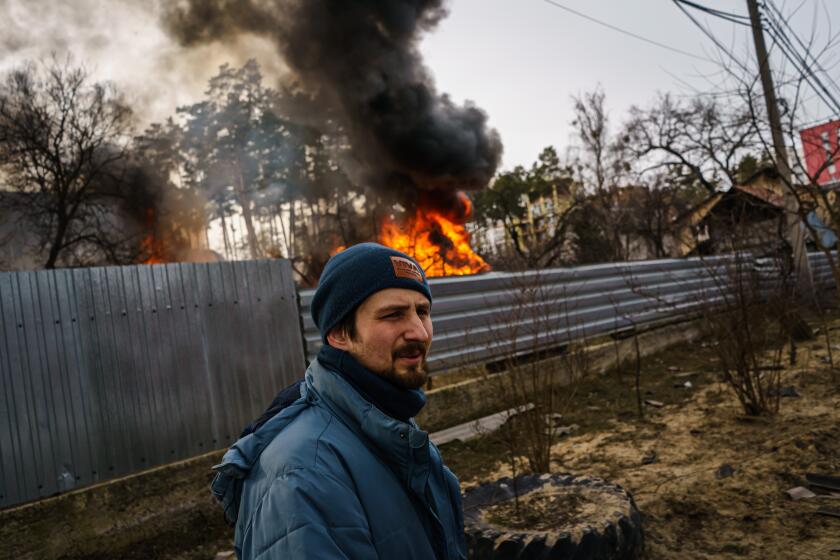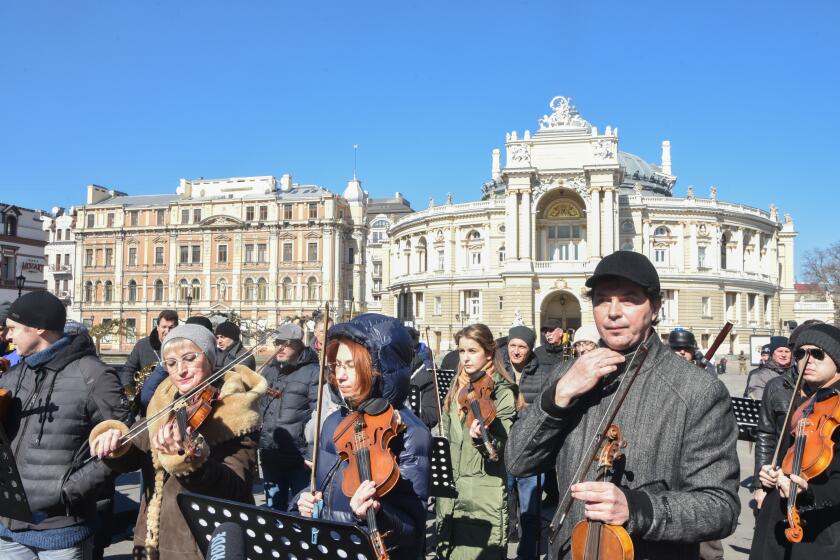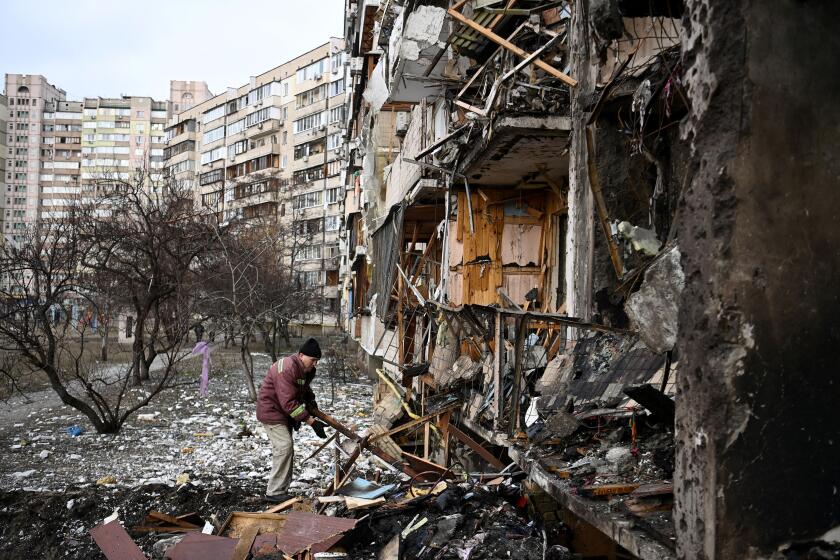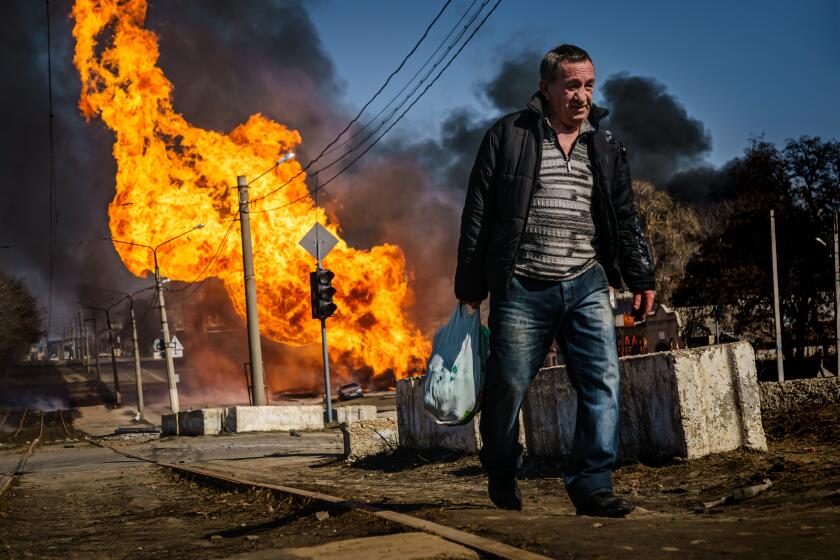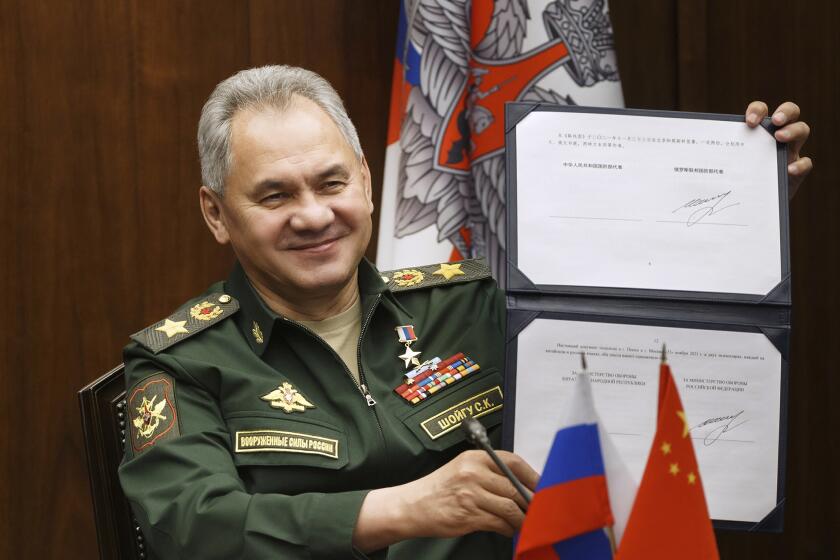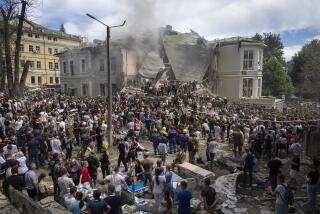European leaders meet with Zelensky in Ukraine as Biden plans to visit NATO headquarters

Overnight blasts hit a high-rise apartment building in Kyiv’s western Sviatoshynskyi district, leaving four people dead and 35 injured.
KYIV, Ukraine — As Russian forces pressed their deadly assault on Ukraine’s capital Tuesday, the besieged country received new gestures of important international support: the arrival in Kyiv of leaders of three European nations and a planned trip to Brussels next week by President Biden for an emergency summit at NATO headquarters.
The White House announced that Biden will attend an emergency session of NATO next week as Ukrainian President Volodymyr Zelensky pushed his call for urgent military aid in a virtual speech to the Canadian Parliament, a message he is expected to repeat Wednesday to the U.S. Congress.
Biden’s presence at the NATO summit is intended to showcase U.S. commitment to stopping Russia’s brutal invasion of Ukraine and reassure European allies that Washington is a reliable partner, a once-cherished notion that was damaged during the Trump administration’s favoring of an “America first” policy that often seemed to abandon traditional multilateral cooperation.
It follows high-profile trips by Vice President Kamala Harris and Secretary of State Antony J. Blinken to Poland and other Eastern European countries that are experiencing the brunt of a massive exodus of refugees from Ukraine. Polish media speculated that Biden would also travel to Poland but the White House did not confirm that.
A woman reacts as she stands in front of a house burning after being shelled in the city of Irpin.
The prime ministers of Poland, Slovenia and the Czech Republic, which all belong to NATO as well as the European Union, traveled by train Tuesday into the Ukrainian capital, Kyiv, where they met with Zelensky, who posted a video of the encounter on social media.
It was the first high-level visit by officials from either alliance since Russia invaded Feb. 24.
“It is here, in war-torn Kyiv, that history is being made,” Polish Prime Minister Mateusz Morawiecki said on Twitter. “It is here, that freedom fights against the world of tyranny. It is here that the future of us all hangs in the balance.”
In Kyiv, blasts hit a high-rise apartment building in the western Sviatoshynskyi district, leaving four people dead and 35 injured. Shock waves from the shelling damaged a subway station just three miles from Zelensky’s office, bringing the war’s destruction close to the city center.
In total, Zelensky said attacks hit four multistory buildings in Kyiv and killed dozens, although the number could not be independently verified. In the east, officials said there were more than 60 overnight strikes on Ukraine’s second-largest city, Kharkiv, that hit the historical center.
Ukrainian representatives also began a second day of negotiations with Russia after cutting short discussions a day earlier for a “technical pause.” Three previous rounds of talks have produced little progress, although Zelensky described Monday’s session as “pretty good.”
Volunteers face grim decisions in Irpin, a suburb of Kyiv, as Russian forces continue their inexorable advance.
On Tuesday afternoon, presidential advisor Mykhailo Podolyak tweeted that the talks were “ongoing” and that Ukraine wanted to address “general regulation matters, cease-fire, withdrawal of troops from the territory of the country.”
Ukraine, meanwhile, informed the United Nations’ nuclear watchdog that the Chernobyl power plant in northern Ukraine was reconnected to the national electrical grid. Russian forces took control of the plant on the first day of the invasion, and two weeks later, on March 9, it lost electrical power.
The International Atomic Energy Agency said that over the weekend teams of specialists repaired one of two damaged lines linking the plant to the power network, allowing staff to switch off the diesel generators they had been relying on. Russian troops are keeping all 211 technical personnel and guards at the plant, the site of the biggest nuclear accident in history.
Even as they negotiated, Ukrainian leaders continued to plead for help from Western nations in putting a stop to Russian President Vladimir Putin’s invasion. According to the United Nations, at least 636 people have died in Ukraine — the number is probably much higher — and at least 3 million refugees have fled the country, nearly half of them children. Half of the refugees have gone west to Poland.
In Kyiv, residents were awakened about 5 a.m. Tuesday by a series of blasts that rumbled through buildings in the city center. Ukrainian authorities said they were Russian artillery strikes.
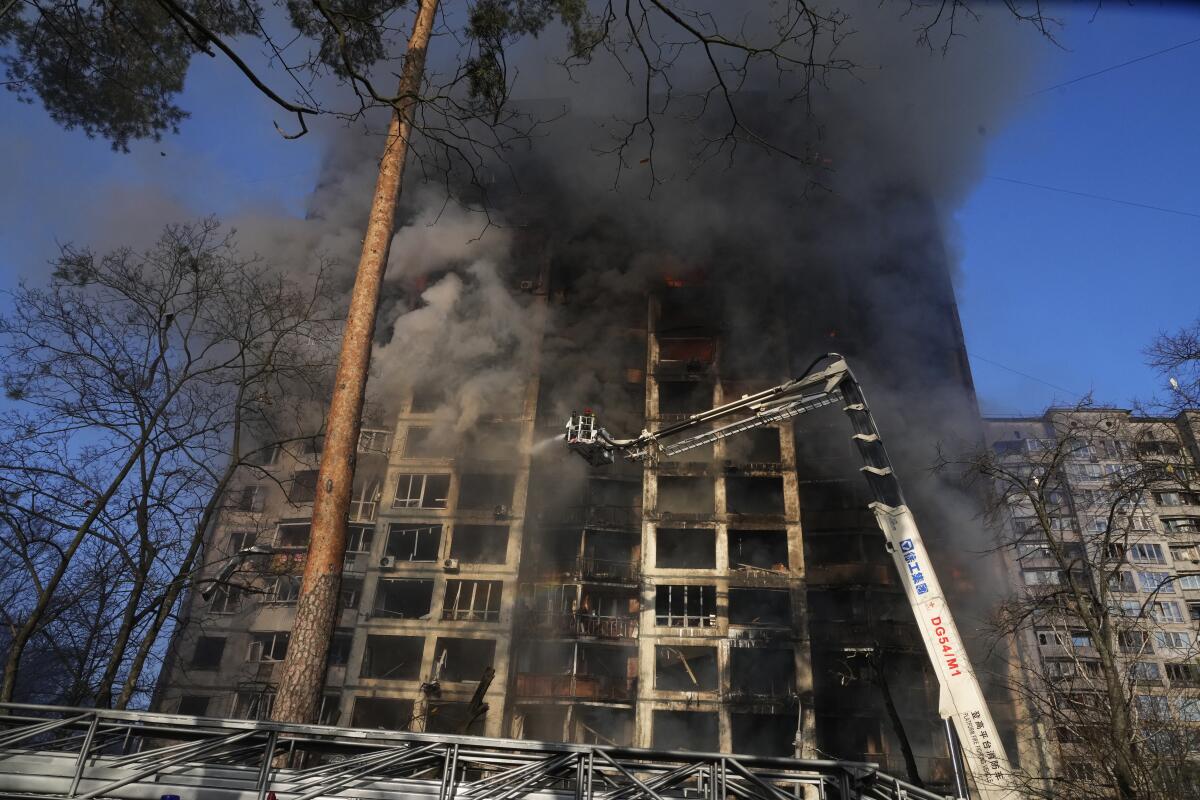
The shelling killed at least four people in the apartment high-rise and sparked a fire that smoldered for hours after firefighters put out the flames.
Kyiv Mayor Vitali Klitschko announced a 35-hour curfew from Tuesday night to Thursday morning, saying on the Telegram messaging app that the city had reached “a difficult and dangerous moment.”
Before nightfall Tuesday, with the cold spell broken, some Kyiv residents enjoyed a day out in the sun, walking around parks and avenues that only a few weeks before were crowded with people. But when darkness came, the booms of explosions pounded in greater frequency.
As curfew approached, soldiers manning checkpoints seemed tense. “Mister, why are you here?” one asked. “There’s war.” The soldier kept a hard stare on the pedestrian before finally letting him continue on his way.
An artillery strike earlier Tuesday also hit the yard in front of a residential building in the Vynogradir neighborhood, spraying shrapnel into a number of apartments but leaving no casualties. Dazed-looking residents tiptoed through a carpet of glass and debris, and chucked out twisted window frames, damaged household appliances and pieces of furniture for hours after the attack.
Wang Jixian of China lives in Odesa, Ukraine, and posts videos of his life in the war zone.
“We weren’t hit. We are staying in a house outside Kyiv, but neighbors told us our apartment was hit,” said one resident, who gave only her first name, Dasha.
She picked through her living room, removing photographs from a blown-out frame and putting them in a bag. She stepped up to a shelf full of toiletries, reached a hand out to sweep them into the bag, then stopped as tears overcame her.
Near the damaged Lukyanivska subway station, a powerful barrage was thought to have targeted the offices of Artem, a Ukrainian missile manufacturer. But the blast didn’t spare the nearby row of shops, including bakeries, a cellphone store and a Roshen chocolatier. The force of the explosion blew through a nearby McDonald’s, triggering a siren blaring through a commercial center.
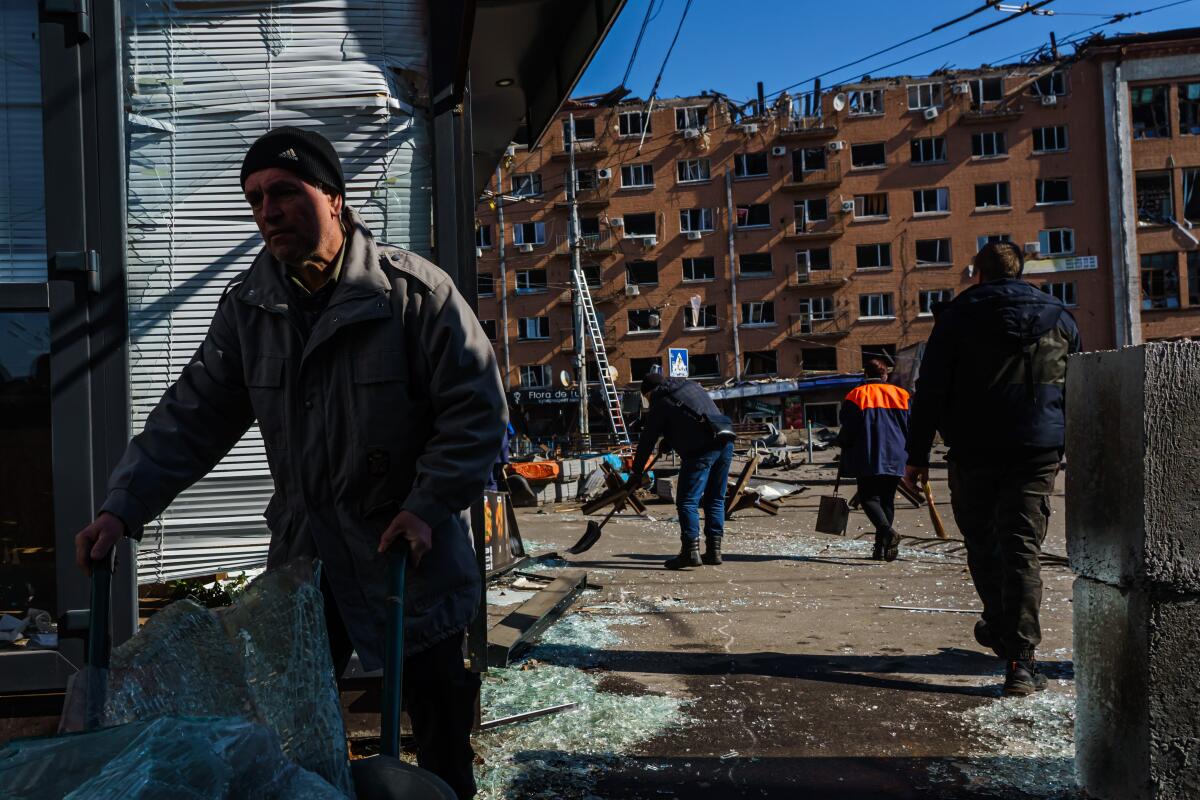
Maxim, the proprietor of three bakeries along the strip, loaded his espresso machine, coffee grinder and whatever else he could salvage into a truck. Igor Yuchov cleared out the shattered glass in front of his cellphone shop.
“It’s our job to clean this and fix it, even now,” he said.
In a video recorded in front of one of the damaged apartment buildings, Ukrainian lawmaker Oleksiy Goncharenko shouted a desperate demand for Western countries to establish a no-fly zone.
Breaking News
Get breaking news, investigations, analysis and more signature journalism from the Los Angeles Times in your inbox.
You may occasionally receive promotional content from the Los Angeles Times.
“One more attack in Kyiv.... Just close Ukrainian sky. Do it immediately,” said Goncharenko. “Give us aircraft, air defense. We’ll do everything ourselves but please help us.”
At NATO headquarters in Brussels, Secretary-General Jens Stoltenberg on Tuesday scheduled an emergency summit for March 24 for the organization’s 30 leaders to discuss ways to bolster NATO presence, especially in Eastern Europe. The alliance will address “further strengthening NATO’s deterrence and defense in response to a new reality for our security,” Stoltenberg said.
White House Press Secretary Jen Psaki announced Biden would attend.
Yet it was the presence of the European leaders — Petr Fiala, the Czech premier; Janez Jansa, the prime minister of Slovenia; and Poland’s Morawiecki and Jaroslav Kaczynski, the country’s de facto leader — that gave an immediate boost to the struggling government of Ukraine.
After the meeting, Zelensky said: “We absolutely trust the leaders of these countries and, therefore, when we speak of security guarantees, of our future in the European Union, or speak of sanctions policy, we know 100% that everything we are discussing will really lead to that positive goal for our country, for our security and for our future.”
The meeting, in the middle of a war where Russia has made advances but failed to take the capital, marks an impressive tribute to Zelensky, who refused offers of evacuation and has become an international hero for his defiant videos from the streets of Kyiv. While Russian forces have slowly moved closer to the city and caused major damage on its outskirts, such as to its northwest in Irpin, major routes to Kyiv are still open and functioning.
Although their nations are North Atlantic Treaty Organization members, the alliance insists that its forces cannot risk establishing a no-fly zone over Ukraine, engaging directly with Russia warplanes and engulfing the world in a much larger conflict.
Russia’s battle is moving to the heart of Ukraine’s capital. The longer the war rages, the harder it will be for emigrants and refugees to return.
“At this moment, speaking of our values, there is no country on the whole of our continent which is more European than Ukraine,” Jansa tweeted. “Thank you for not only defending your homeland and Europe as a territory but for defending the very core of European values and our way of life. Your fight is our fight and together we will prevail.”
Ukraine is not a member of the EU, but Zelensky has asked for fast-track accession to the bloc for his embattled nation, which is unlikely to be granted.
As he has several times during the last 20 days of war, Zelensky made a direct appeal to the Russian people in a video uploaded to Telegram on Monday night.
“As long as your country has not completely closed itself off from the whole world, turning into a very large North Korea, you must fight,” Zelensky said, telling Russians to stand up against the Kremlin’s war. “You must not lose your chance.”
The Times’ Marcus Yam, no stranger to war photography, gives a first-person account from Ukraine.
In his address Tuesday to the Canadian Parliament by video, he said that 97 children had been killed in the war so far.
“I don’t wish this on anyone, but this is our reality,” he said, adding that, with the constant shelling, “every night is a terrible night.”
In his address to Congress, scheduled for Wednesday morning, Zelensky is expected to make another plea for a no-fly zone, more sanctions against Russia and more military assistance — such as fighter jets — to Ukraine. Congress recently approved $13.6 billion for military and humanitarian aid for Ukraine.
The U.S. announced new sanctions Tuesday on several Russian individuals and on Alexander Lukashenko, the president of Belarus, who allowed his country to be a launchpad for Moscow’s invasion of Ukraine from the north. Also on Tuesday, Britain imposed sanctions on 370 people described as oligarchs or “Putin’s political allies and propagandists.”
For its part, Russia announced that it has imposed sanctions on 13 Americans, including Biden, Blinken and former Secretary of State Hillary Rodham Clinton.
Psaki responded: What “I would say that won’t surprise any of you is that none of us are planning tourist trips to Russia and none of us have bank accounts that we won’t be able to access, so we will just forge ahead.”
The U.S. says China has responded affirmatively to a request from Russia for military equipment to assist it in its war on Ukraine.
Bulos reported from Kyiv, Kaleem from London and Wilkinson from Washington. Times staff writers Andrea Castillo and Anumita Kaur contributed from Washington.
More to Read
Sign up for Essential California
The most important California stories and recommendations in your inbox every morning.
You may occasionally receive promotional content from the Los Angeles Times.
